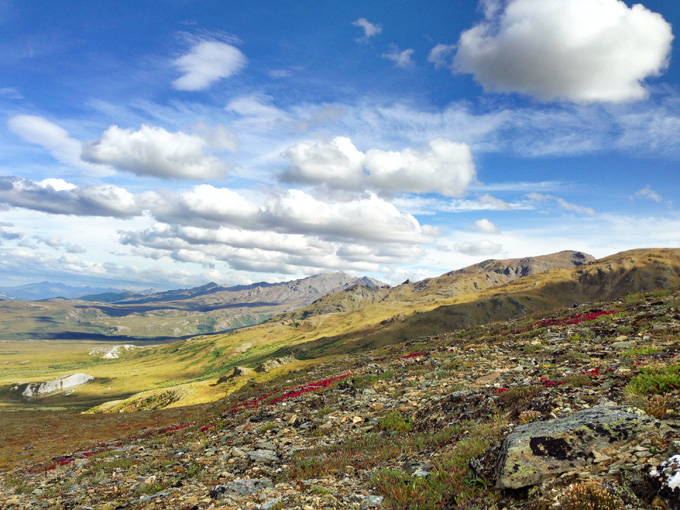
When we’re at the cabin, we usually have only two ways to communicate with the outside world: an oversized satellite phone and a hulking transistor radio that receives two stations if we place the antenna just so.
One of these stations is KUAC, broadcasting from the University of Alaska at Fairbanks. That’s how we get our NPR news in the morning. The other is KIAM, the “Gospel Voice of the Wilderness,” with a strong signal out of Nenana. We tune in to KIAM for regular weather reports — though it’s not easy to get an accurate forecast for our small portion of the immense Alaskan Interior — and for Mukluk Messages.
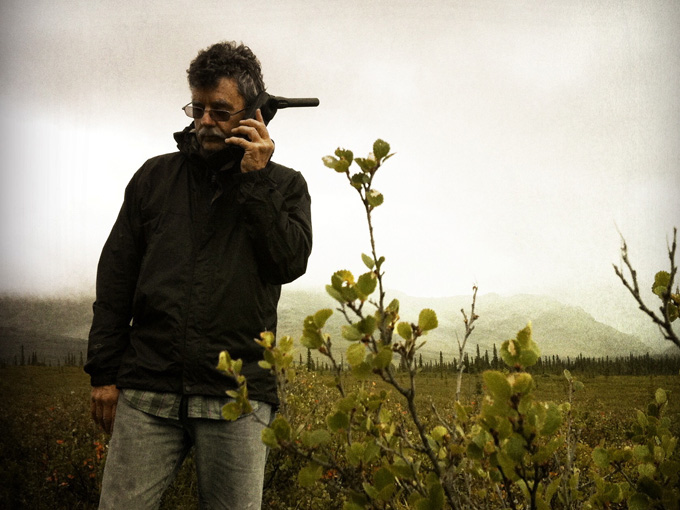
Mukluks are like eavesdropping on the home answering machines of strangers. If you know anyone who’s out in the bush without two-way communication and you have something you want to say to them, you can call, email, or text the radio station and leave a message that will be broadcast for the entire listening audience to hear. This audio clip will give you an idea of what that’s like . . .
When I’m in Fairfax, I sometimes use Mukluks to reach Stewart at the cabin — for instance, there was that time he put a padlock on the basement door and forgot to leave me the combination. When Stewart and I are both at the cabin, my mom sometimes leaves a Mukluk with KIAM to say hello and let us know how things are going at home. I look forward to every Mukluk and, if Stewart is puttering around outside, I’ll keep listening straight through the river report, the fishing schedule, and all the local announcements about church picnics, rummage sales, and so on. I even work on memorizing the weekly bible verse, which is always read out at Mukluk time. Stewart doesn’t have the same enthusiasm, or even patience, for some of these things — and I’m not sure why I love them so much. It makes me feel at home, I suppose. I like to imagine a river running 34 feet deep and I enjoy hearing what’s going on with folks who feel like our neighbors, even though they may be 100 or more miles away. Besides, what else is there to do?
Sadly, there are far fewer Mukluks now than there used to be. While there hasn’t been a boom of literal inroads to the Interior, the need for Mukluks has diminished with the broadening reach of technology. Many more people in the bush have cell phone coverage or satellite internet hookups.
For us, bringing internet to the bush was an experiment. We sometimes talk about a longer stay at the cabin, perhaps several months instead of the usual four to six weeks. A stretch like that would be difficult to manage without a reliable connection to friends, family, and work. So why not try the internet? We had strong suspicions about how the setup would affect our experience of the wilderness, but we were curious enough to investigate.
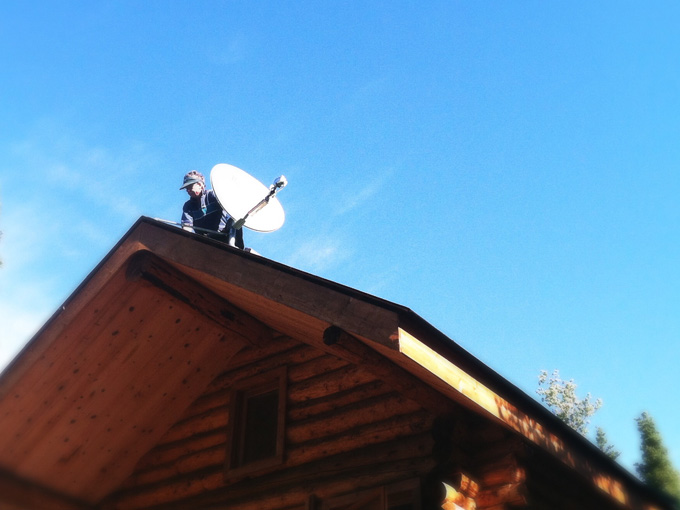
Because the system had to be installed by one of the internet provider’s licensed technicians, Stewart took a day-long training in Fairbanks to get the required credential. That was more feasible, practically and economically, than chartering a helicopter to bring a company representative to us. (In this undertaking, it helped that Stewart has a background in science and engineering and that, unlike me, he is not afraid of heights.) We purchased the satellite dish, a modem, hundreds of feet of cable, and all the necessary hardware. Then, once we got to the cabin, using a system of braces and ropes and I don’t know what all else, Stewart installed the dish on the roof.
When that was done, we spent a long time chasing the best signal. Stewart sat up on the roof making infinitesimal adjustments to the dish while I hunkered down in the cabin staring at shifting grafts on a computer screen, shouting numbers out the window. In the end, he climbed a sixty-foot spruce tree with a saw in one hand and lopped six feet off the top. (Sometimes that tree grows to eighty feet in my mind; honestly, I’m not sure how tall it really was — it was tall, in any case.) When the system finally worked, we were stunned. For better or worse, we got mail.

To moderate the effects of so much stimulation, we installed the modem in an outbuilding and rationed our connection to one hour per day for each of us. Right away, our new situation created a subtle tension: When were we going to get our hour of screen time, and whose turn was it?
Day by day, the irritations grew. Usually, one or the other of us would come back from our internet time feeling bothered about something, whether a problem at home that we were helpless to solve from a distance, or more world news than we really wanted. (A single, morning dose of NPR is surprisingly sufficient.) Often, we were simply frustrated by the technology, which worked fine, but not at the miracle speeds we’ve become used to. (How did we contract this epidemic disease of entitlement? I mean, I find myself bothered on flights to Alaska when the internet connection drops out over Canada, even though I’m flying through the air in a metal tube. What happens to my sense of perspective?) By the end of our trip, we’d spent many moments — and even hours — of our priceless time in the wilderness concerned with and complaining about the slowness of updates and downloads, the annoyance of dropped connections, and the steps we had to follow to avoid inadvertently burning out our blinking, mercurial modem.
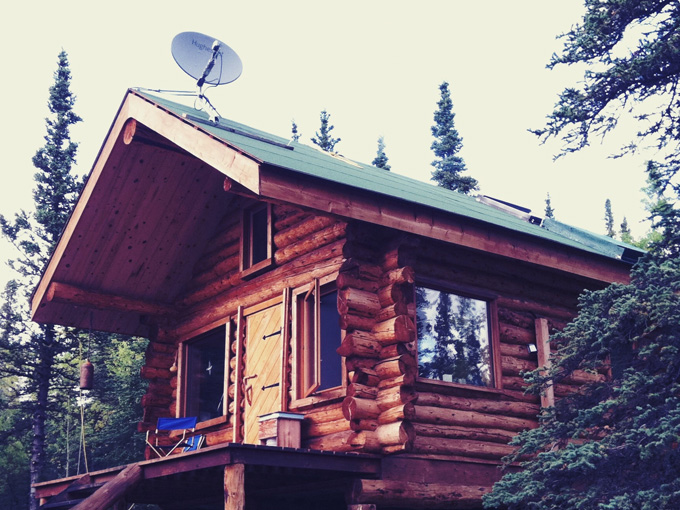
Remembering this experience now, I think of a 1941 quote from Carl Jung that haunts me wherever I am:
All time-saving devices, amongst which we must count easier means of communication and other conveniences, do not, paradoxically enough, save us time but merely cram our time so full that we have no time for anything. Hence the breathless haste, superficiality, and nervous exhaustion with all the concomitant symptoms — craving for stimulation, impatience, irritability, vacillation, etc. Such a state may lead to all sorts of other things, but never to any increased culture of the mind and heart.
(The Collected Works of C.G. Jung, Volume 18)
The next summer, knowing the value of our cabin time for both mind and heart, the entire internet procedure occurred in reverse. We pulled out the hundreds of feet of cable, packed up the modem, and took the dish off the roof. (I still wish we could put the top of that spruce tree back where it belongs.) We felt that the cabin itself breathed easier then, as though we had forced it to wear a silly, pointy party hat and it was thankful to be restored to its natural dignity. Dismantling the internet returned that same quiet dignity to us.
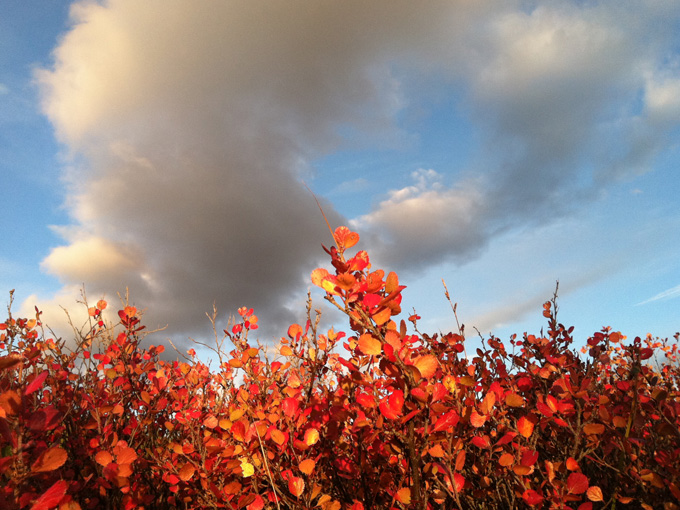
Love Mukluk messages! Kind of a Tundra Home Companion… :)
LikeLike
Yes! It just wouldn’t be the same without Mukluks. :-)
LikeLike
Fascinating! All of it! That quote, too, it’s incredible. I have been slowly deleting accounts (Twitter, for example) and it feels good. Sometimes I come to the computer out of habit, and then I think: why am I here? Then I go sit in a comfy spot and read. Feels much better.
LikeLike
The quote is everything. And to think he was responding to things like the telephone, radio, airplanes. It hurts to imagine how he would feel about the internet. Reading, writing a letter (by hand!), being outside . . . the best antidotes.
LikeLike
I so love this blog. Mukluks! Wow. Of course. And yes, I’m with you re. no internet. I remember the month I spent in Greece and Turkey. No internet. And no pain. There. Present.
LikeLike
I love knowing who feels the same about needing to break from the internet. (And of course here we are having this conversation on the internet. Good grief.) Also, I dream of a month in Greece. Sounds so wonderful.
LikeLike